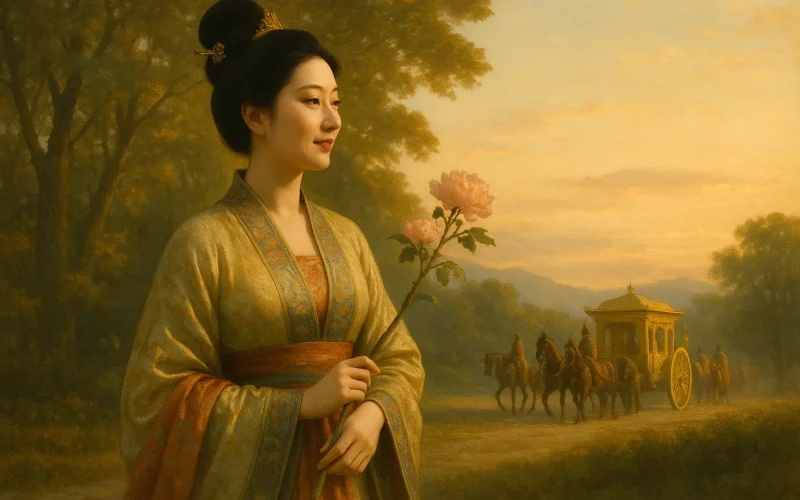She dabs at makeup, half-done, with artless air,
Her sleeves droop low, her shoulders bare—a child's careless flair.
Yet for this artless grace, the emperor's care she wins,
And by his royal chair, a spray of flowers she tends and spins.
Original Poem
「应诏嘲司花女」
虞世南
学画鸦黄半未成,垂肩亸袖太憨生。
缘憨却得君王惜,长把花枝傍辇行。
Interpretation
This poem was likely composed during the reign of Emperor Taizong of Tang. The Tang court employed "Flower Maidens" (司花女 sī huā nǚ), who managed floral arrangements and also served as entertainers. As a prominent court official, Yu Shinan wrote this piece after encountering an endearingly artless Flower Maiden during a banquet or imperial event. With a light and playful tone, the poem depicts the maiden’s unstudied charm and her unexpected favor with the emperor, offering both a vignette of court life and a reflection on the value of natural simplicity over crafted elegance.
First Couplet: "学画鸦黄半未成,垂肩亸袖太憨生。"
Xué huà yā huáng bàn wèi chéng, chuí jiān duǒ xiù tài hān shēng.
She tries to paint yellow blossoms but leaves the work half-done;
Her shoulders slouched, sleeves drooping—utterly artless and charming.
“Yellow blossoms” (鸦黄 yā huáng) refer to the yellow pigment used for painting flowers. The phrase “half-done” highlights her charmingly unskilled attempt, while “slouched shoulders and drooping sleeves” vividly capture her artless demeanor. This is not mockery but an affectionate emphasis on her natural simplicity (质朴 zhìpǔ), contrasting with the typical refined elegance of palace women.
Second Couplet: "缘憨却得君王惜,长把花枝傍辇行。"
Yuán hān què dé jūnwáng xī, cháng bǎ huāzhī bàng niǎn xíng.
Yet because of this artlessness, she wins the monarch’s fondness;
Often holding flower branches, she walks beside the imperial carriage.
Here, the poet reveals the value of her artlessness (憨 hān): it is her genuine, unpretentious manner that endears her to the emperor. “Walks beside the imperial carriage” (傍辇行 bàng niǎn xíng) signifies her privileged position—though a Flower Maiden, her innocence earns her a place of honor.
Holistic Appreciation
This short poem uses a humorous and playful tone to portray an artless yet captivating young woman in the court. The first couplet depicts her innocence (天真 tiānzhēn) and clumsy charm, while the second explains how this very artlessness brings her the emperor’s affection and a place near him. Through this subtle contrast between her lack of skill and her unexpected favor, Yu Shinan captures a telling court episode in concise, vivid language, blending light satire with reflective insight.
Artistic Merits
- Humorous and light tone: The poem’s playful voice reflects the poet’s wit and observational style.
- Vivid characterization: Details like the “half-done painting” and “drooping sleeves” instantly evoke a charmingly artless figure.
- Effective contrast: The juxtaposition of her clumsiness and imperial favor adds depth and interest.
- Insight into court life: The poem mirrors how minor figures could win favor through temperament rather than skill.
Insights
The poem portrays an unskilled yet genuinely artless maiden who gains the emperor’s affection precisely through her innate simplicity. It conveys a deeper message: while society often values refinement and skill, true connection often arises from authenticity and unadorned nature. This “artlessness” is not a flaw but a form of sincerity that can inspire true affection and respect. The poem reminds us that in life, though talents and skills are prized, preserving inner innocence and genuineness can lead to unexpected appreciation and understanding.
About the Poet

Yu Shinan (虞世南 558 - 638), a native of Yuyao in Zhejiang Province, was a prominent statesman, writer, calligrapher, and politician during the Zhenguan era of the early Tang dynasty. As one of the "Twenty-Four Meritorious Officials of Lingyan Pavilion," he rose to the position of Director of the Imperial Library. His calligraphy earned him a place among the "Four Great Calligraphers of the Early Tang," alongside Ouyang Xun, Chu Suiliang, and Xue Ji. In poetry, he inherited the tradition of Xu Ling and pioneered a refined, balanced, and harmonious courtly style. He also compiled the North Hall Book Excerpts, establishing a new genre of encyclopedic literature.












